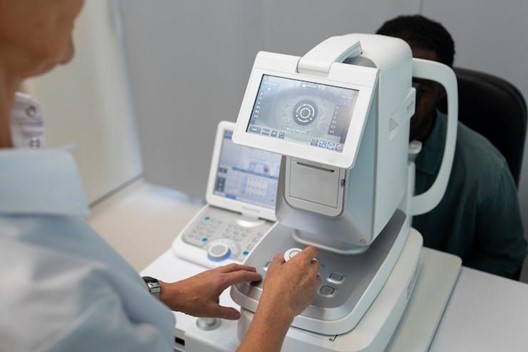Common Age-Related Eye Conditions
Our eyes are prone to several conditions as we age, including presbyopia, cataracts, age-related macular degeneration (AMD), and glaucoma. Presbyopia, starting around age 40, causes difficulty with close-up tasks and is managed with reading glasses or multifocal lenses. Cataracts involve clouding the eye’s lens, leading to blurred vision and glare, and are effectively treated with surgery. AMD, a leading cause of vision loss in older adults, affects central vision and can be either dry or wet, with various treatments to slow progression. Glaucoma, marked by increased eye pressure damaging the optic nerve, requires early detection and treatment to prevent vision loss. Understanding these conditions is crucial for managing and preventing age-related eye issues.
Causes And Risk Factors For Age-Related Eye Conditions
Most age-related eye conditions arise from natural aging, as the eye’s structures gradually change and deteriorate over time. For instance, the lens loses flexibility, leading to presbyopia, and proteins can clump, causing cataracts. The macula, crucial for central vision, can also degenerate, resulting in age-related macular degeneration. Risk factors that can increase the likelihood of developing these conditions include family history, lifestyle choices (such as smoking and poor diet), underlying health conditions (like diabetes and high blood pressure), and environmental exposures (such as UV light and pollution). Recognizing these factors and maintaining regular eye exams and a healthy lifestyle are essential for managing and preventing age-related eye issues.
Symptoms And Signs Of Age-Related Eye Conditions
As individuals age, they may notice a gradual decline in visual acuity, manifesting as blurred or cloudy vision, difficulty reading or seeing fine details, and increased sensitivity to glare. Changes in color vision and difficulty adapting to different lighting conditions are also common. Additionally, the presence of floaters—small, moving spots—or light flashes can indicate more serious issues like retinal detachment. Changes in peripheral vision, such as blind spots or narrowing of the visual field, may suggest conditions like glaucoma. Difficulty with night vision, tasks requiring fine motor skills, and symptoms like double vision or eye strain are also notable. Prompt consultation with an ophthalmologist is crucial for proper diagnosis and treatment.
Diagnosis And Screening For Age-Related Eye Conditions
Early detection and diagnosis are crucial for managing age-related eye conditions, making regular eye exams essential. Comprehensive exams include visual acuity testing, slit-lamp examinations, tonometry for glaucoma detection, and dilated eye exams for viewing the eye’s interior. Specialized tests like Optical Coherence Tomography (OCT), fluorescein angiography, and visual field testing improve diagnostic accuracy. These evaluations help develop personalized treatment plans to manage conditions and preserve vision, highlighting the importance of routine eye screenings as we age.
Treatment Options For Age-Related Eye Conditions
Treatment options for age-related eye conditions vary based on the specific condition, its severity, and the individual’s health. For cataracts, the primary treatment is surgery to remove the clouded lens and replace it with an artificial intraocular lens, often with additional glasses or contacts for improved vision. Age-related macular degeneration (AMD) treatment depends on the type: dry AMD is managed with dietary changes and nutritional supplements, while wet AMD may require anti-VEGF injections, laser therapy, or a combination of both. Glaucoma treatment aims to lower intraocular pressure and prevent optic nerve damage through eye drops, oral medications, or surgical methods like laser therapy. Vision aids, such as magnifiers or adaptive technologies, may also be recommended to help maintain independence and quality of life. Regular eye exams and collaboration with an ophthalmologist are crucial for effective management.
Lifestyle Changes To Manage Age-Related Eye Conditions
Lifestyle changes are vital to supporting eye health and managing age-related conditions. Eating a diet rich in antioxidants, omega-3 fatty acids, and nutrients like leafy greens and fatty fish is beneficial. Regular exercise and protecting your eyes from UV exposure with sunglasses and hats are essential. Quitting smoking and limiting alcohol intake can help prevent conditions such as macular degeneration and cataracts. Managing underlying conditions like diabetes and high blood pressure through regular check-ups with ophthalmologists and primary care physicians is essential. For urgent issues, urgent care clinics can provide timely treatment.
Tips For Maintaining Eye Health As You Age
To support eye health as you age, prioritize regular eye exams at least once a year for early detection of conditions. Wear protective eyewear during activities that pose eye risks, such as sports or home repairs. Take breaks from digital screens using the 20-20-20 rule to prevent eye strain and ensure good lighting in your living and workspaces to avoid glare. Stay hydrated to maintain eye moisture and manage stress through techniques like meditation or yoga to support overall health. Lastly, seek support groups, patient organizations, or low-vision specialists for valuable resources and assistance if diagnosed with an age-related eye condition. Incorporating these strategies can help maintain eye health and mitigate the risk of age-related eye issues.
Conclusion And Final Thoughts On Managing Age-Related Eye Conditions
As we age, prioritizing eye health and taking proactive measures to manage age-related eye conditions is crucial. Understanding common conditions, their causes, risk factors, and available treatments allows individuals to work effectively with their ophthalmologists to preserve vision and enhance quality of life. Insights from eye care professionals emphasize the importance of regular eye exams, early intervention, and a holistic approach to eye health. Integrating lifestyle changes and staying informed about medical advancements allows you to manage age-related conditions and maintain clear, vibrant vision. Take control of your eye health today to enjoy your later years confidently and without vision-related limitations.

